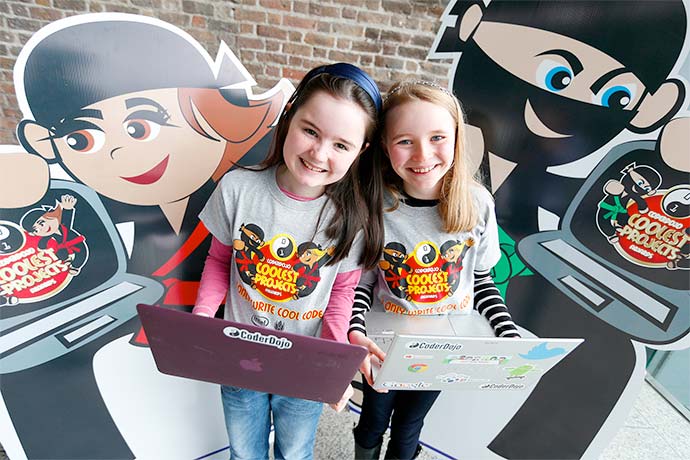The focus is on community, learning with peers, mentoring kids as they learn, and self-paced learning.
Led by volunteers, clubs — called dojos — are connected to over 700 dojos worldwide. While every dojo can develop their own programs, all dojos have access to Zen, an online community where people can share ideas, ask questions, and work together to help kids become comfortable with technology. If a dojo doesn’t exist near you, it’s easy to create one through the CoderDojo website.
Started in July 2011 in Cork, Ireland by James Whelton, then 18 years old, with help from Australian philanthropist Bill Liao, CoderDojo began as a way for kids to learn programming in local clubs in a fun, safe, and social environment. The clubs quickly spread to all five continents.
In 2013, the CoderDojo Foundation was created to support new and existing dojos with resources and a community platform, as well as scale CoderDojo through partnerships. The Foundation allows each dojo to pursue their local interests while ensuring all dojos are connected to their members and other dojos.
Mary Moloney, CEO of the CoderDojo Foundation explains, “Kids explore the magic behind the technology that surrounds them in their everyday lives. They develop an understanding of how technology works. From there they become creators of technology. They develop creativity and innovation skills and start to build apps, games, websites and even business solutions.”
There are 750 plus dojos in 59 countries around the world touching the lives of 30,000 kids.
“Kids are introduced to many types of software and hardware,” Moloney says, “Many have already developed projects relating to drones, 3-D printing, wearable technology, virtual reality and robotics. They are fully empowered in their own learning journeys. The CoderDojo model is child centred learning, not curriculum based. So each young person focuses on technology that interests and excites them to develop projects that they choose. They also develop ancillary skills in logic, computational thinking, project mangement and problem solving, without even realising it, it’s just what you do!”
Moloney got involved with CoderDojo with her kids, attending meetings then starting their own local dojo. She left Accenture after 23 years and having become a Managing Director. “I’d firsthand experience of the benefits and impact of CoderDojo. When I was approached about taking up the role of CoderDojo Global CEO, I thought, opportunities like this don’t appear too often, to be involved in a movement with such a positive impact on so many young lives, would be such a privilege and honour, so I couldn’t let it pass!”
Carola Faughnan is another parent involved in CoderDojo. She and her two boys got involved in a local dojo in Wexford, Ireland. When she called up the dojo to learn if it would meet in the new school term, she learned the group needed someone to run the dojo. The large number of phone calls and attendees had overwhelmed the small space offered by the Wexford Study Hub. Faughnan decided to take on managing the group. She found a bigger space and used the CoderDojo tools and lots of volunteers to share the responsibilities.
“Our first CoderDojo for Wexford Town was on the 7th March 2014, one week before my baby was born. Just in time! I missed the second dojo as he was born on that day, but baby and I went along again the following week and I have only missed one since.”
“The CoderDojo is a community project so everyone there is really grateful, happy and energised by the whole thing. It’s a privilege to be a part of this. The other best thing; the kids are actually learning and developing confidence in their abilities. We also have a few kids on the autism spectrum who are extremely smart but don’t have many social outlets. At CoderDojo, they are heroes!”
Kids also like CoderDojo. Niall, age 10, from CoderDojo Gorey, first got involved when his dad heard about the program on the radio then mentioned it to him. He not only had fun but he also became a mentor to other kids. “The neatest thing I’ve learned is making apps and publishing them to the Apple App Store. It was difficult and frustrating, but finally I got great satisfaction when my game was published.”
CoderDojo kids also includes lots of girls who attend their local dojos. Mary Moloney, the CoderDojo Foundation CEO, says, “We’ve just launched a CoderDojo girls initiative to encourage further participation from girls, we currently average 30% attendance from girls but would love to further improve that.”
Getting involved is as easy as looking up your location on the CoderDojo website. If a group does not exist, CoderDojo provides lots of support, ideas, and direction to help start a local group. For example, this fall (2015) an updated online community hub will be relaunched. The hub connects local dojos with their members as well as all dojos with other groups around the world.
Mary Moloney adds, “We’re also launching a new suite of coding tools to help to introduce young people to multiple coding languages. Everything we do is in collaboration with the extended community of volunteers, of which there are approximately 5,000 at the moment!”
Learn More
CoderDojo
https://coderdojo.com/
https://coderdojo.com/about/
https://coderdojo.com/start-a-dojo/coderdojo-tao-recommended-practice/

